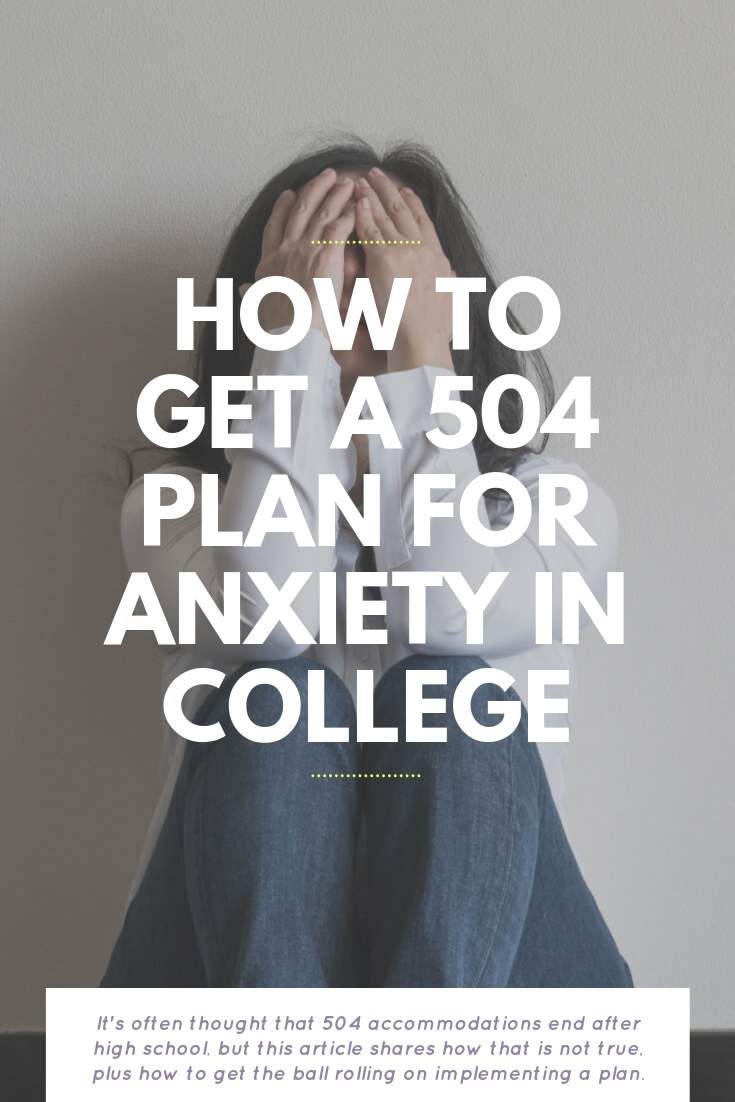This is a question I often hear, and it’s one that I also hear and see answered incorrectly. The short answer is: yes. Colleges must provide accommodations through section 504.
In case you don’t know what a 504 Plan is or what it does, here’s the full definition, per the U.S. Department of Education.
In a nutshell, it is this: a written plan that ensures that a student who has a disability identified under the law receives accommodations to ensure the student receives the same access to academic success as everyone else.
It levels the playing field for students who have a disability - no matter how large or small, and no matter if it’s permanent or temporary.
For example, if your child has ADHD, he might have a 504 Plan that allows him to have extra time on assignments, or to be allowed to sit in a quiet area, free from distractions, when needed.
Or let’s say your child is recovering from a severe illness and she’s easily fatigued.
You could put a 504 into place to allow her to rest in the nurse’s office, and then have the 504 terminated when she’s able to fully function again.
I’ve written more about our experience with the 504 Plan for our youngest son in this post, which answers a few frequently asked questions, and tells you how to get the ball rolling on implementing a 504 Plan for your child, and this one - my first article on the subject, which was featured internationally on Huffington Post back in 2016, and then this one, which I wrote in response to the ruffled feathers I caused in that Huff Post article.
But in today’s post, I want to talk about services available to your child once he graduates high school and moves on to college.
The reason it’s common to get conflicting information out there in the wild is because colleges don’t fall under the Individual with Disabilities Education Act (referred to as IDEA)1.
This means that colleges don’t have to offer the same accommodations to students as what they’ve gotten in high school.
Colleges are bound, however, by federal civil rights laws, including Section 504 of the Rehabilitation Act of 1973 and the Americans with Disabilities Act (ADA)(2), which means they’re required to offer accommodations to a student who provides evidence that he requires a specific accommodation in order for him to have equal access to education and to avoid discrimination.
You can see how it’s a very slight difference - a technicality, really.
The very bottom line is that if your student has a true disability, with a medical diagnosis, and one that she can provide evidence of needing an accommodation, she is eligible for that accommodation in college and should absolutely go through the proper channels to get that in place, whether she thinks she needs it or not.
It needs to be in place as a safety net, if nothing else, in case she ends up needing it, and the process can take a while to get it all set up.
The biggest difference in services for college versus high school is that in college, your student is 100% responsible for themselves. He has to seek out and register for the office responsible for upholding the ADA and Section 504 himself (5), as well as providing documentation required.
This is why it’s extremely important to teach and practice self-advocating skills to your teenager as early as possible. It’s great to communicate with your child’s teachers, but you have to also teach your kid to speak up on their own behalf, too. There’s more on this in the Resources section at the end of this post.
How To Get 504 Services In College
Prerequisite: Have A 504 In High School
Before the first step is this prerequisite step, which is to have a 504 Plan in place in high school. This isn’t necessarily a requirement, but certainly won’t hurt your student’s case to show that accommodations were needed in high school.
Disability Services At Your Student’s College
The very first step - after the prerequisite step - is to search for disability services at the college where your student is applying. Just a general search of, “[college name] disability services” should give you the exact pages you’re looking for.
You’ll be required to submit documented proof of the student’s disability, and there will likely be meetings between the student and the disabilities services office personnel to determine appropriate accommodations.
I wish we’d put a 504 into place for our oldest son because it could have made things different (better) for him his first year in college.
But we didn’t know what we didn’t know.
He was a highly successful high school student, with straight A’s and a nice collection of accolades. A huge departure from the young kid who suffered crippling anxiety, we were all breathing a collective sigh of relief, by the time high school rolled around, that he was growing into a relaxed and confident young man.
He earned himself automatic admission into a highly competitive Texas college, and got into one of the toughest Engineering programs in the country.
And then he just… stopped going to class.
Anxiety and depression had resurfaced for him and we didn’t know it. He’d kept it a secret from us.
We now know that what started as a few missed classes - typical freshman stuff: staying out too late and sleeping through 8 a.m. classes - turned into a fear of being called out by professors upon his return, and then evolved into a “funk” from his spiraling grades, and eventually he was in a full-blown depression, not leaving his room at all. Even for meals.
I drove out to him, brought him home and got him to a psychiatrist, who treated him immediately for depression and anxiety, and suggested we meet with the college’s disabilities services to see what they could do about his grades.
It’s at this point where I wished we’d had a plan in place.
Something that showed he had a history of depression and anxiety.
His college was amazing, and was more than willing to work with our son so that he’d be “forgiven” in a way, so that his GPA wouldn’t take a hit, but he instead withdrew and moved back home.
It was a hard, hard time for our family, but I will tell you that he’s doing much better, now, although the last year was a long and hard one.
If we’d had an accommodations plan in place for him at the start, we would have been able to pull that safety net under him much faster, and he likely would have been able to salvage those two semesters.
Nevertheless, we couldn’t have known that his anxiety and depression would resurface after all those years. Again: we didn’t know what we didn’t know.
Frequently Asked Questions About The 504 Plan In College
How To Get A 504 In College
Start the conversation regarding your student’s disabilities with the institution as early as the beginning of his senior year in high school(3).
Again, colleges are not required to waive or change academic requirements, but they are not allowed to discriminate, and are required to provide necessary adjustments for a student to function academically.
What Is A 504 Plan In College
Accommodations under the Section 504 are not referred to as the “504 Plan” in college like it is for high school, however it’s essentially the same thing: accommodations to level the playing field and give every student equal access to function academically.
Each college is different in terms of how they’ll accommodate a student (4), so meeting with disabilities services early on is crucial to make sure you’re comfortable with how they’ll adjust to your student’s needs.
What Are 504 Accommodations For Anxiety In College
Each college is different, so you and/or your student will definitely need to meet with the disabilities services office to formulate a plan customized for your student’s needs. Here are examples of accommodations for anxiety in college:
Beverages permitted in class - to help with dry mouth associated with medications
Pre-arranged breaks - to help with anxiety and stress
Delay in assignment due dates - as needed, if a student is required to have a hospital stay, for example
Flexibility in determining “full-time” status for purpose of determining financial aid and health insurance eligibility
Incompletes rather than failures or withdrawals if relapse occurs
What Are 504 Accommodations For ADHD In College
Again, each college has different ways of accommodating the needs of students, so your student will need to meet with the department responsible for upholding the ADA and Section 504, but here are examples of accommodations for ADHD in college:
More time for tests
Distraction-free or reduced distraction location for tests
Permission to use a laptop
Permission to use a spellchecker
Permission to use a calculator
Note-taking accommodations, including access to someone else’s notes, or permission to record the lectures
The 504 Plan And College Acceptance
Some people believe that colleges look down their noses at students who have a 504 Plan in place in high school, and that it can even hinder their acceptance into college, but that couldn’t be further from the truth.
In fact, colleges and universities do not even know if a student has a 504 in place because they are not allowed to ask if a student has a disability, high school transcripts do not indicate whether an accommodation was made, nor are the SAT or ACT exams flagged.
In fact, by denying acceptance based on a disability, an institution could face an enormous headache of a lawsuit because it would be considered discrimination (6).












